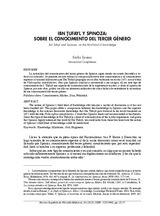Ibn Tufayl y Spinoza. Sobre el conocimiento del Tercer Género
Ibn Tufayl and Spinoza: On the Third Kind of Knowledge
Autor
Tornero, Emilio
Editor
UCOPressFecha
2013Materia
ConocimientoMística
Dios
Felicidad
Knowledge
Mysticism
God
Happiness
METS:
Mostrar el registro METSPREMIS:
Mostrar el registro PREMISMetadatos
Mostrar el registro completo del ítemResumen
La naturaleza del conocimiento del tercer género de Spinoza sigue siendo un asunto discutido y to-davía no aclarado. Se presenta en este trabajo la comparación entre este conocimiento y el conocimiento superior al racional discursivo que Ibn Ṭufayl propugna en su obra traducida en el año 1671 con el título de Philosophus autodidactus, obra que Spinoza conoció y recomendó a sus amigos. Al ser este tipo de conocimiento de I. Ṭufayl una especie de racionalización de la experiencia mística, y dado el aprecio de Spinoza por esta obra, podría ser ello un elemento indicativo de cómo habría de entenderse la naturaleza de ese conocimiento del tercer género The nature of Spinoza’s third kind of knowledge still remains a matter of discussion as it has not been clarified yet. This paper offers a comparison between this knowledge in Spinoza and the superior knowledge to the rational discursive knowledge that Ibn Ṭufayl puts forward in his work translated en 1671 with the title Philosophus autodidactus, a work that Spinoza knew and recommended to his friends. Since this type of knowledge in Ibn Ṭufayl is a kind of rationalization of the mystic experience, and given that Spinoza highly esteemed this work by Ibn Ṭufayl, we could infer from these two hints how the nature of Spinoza’s third kind of knowledge sould be understood

